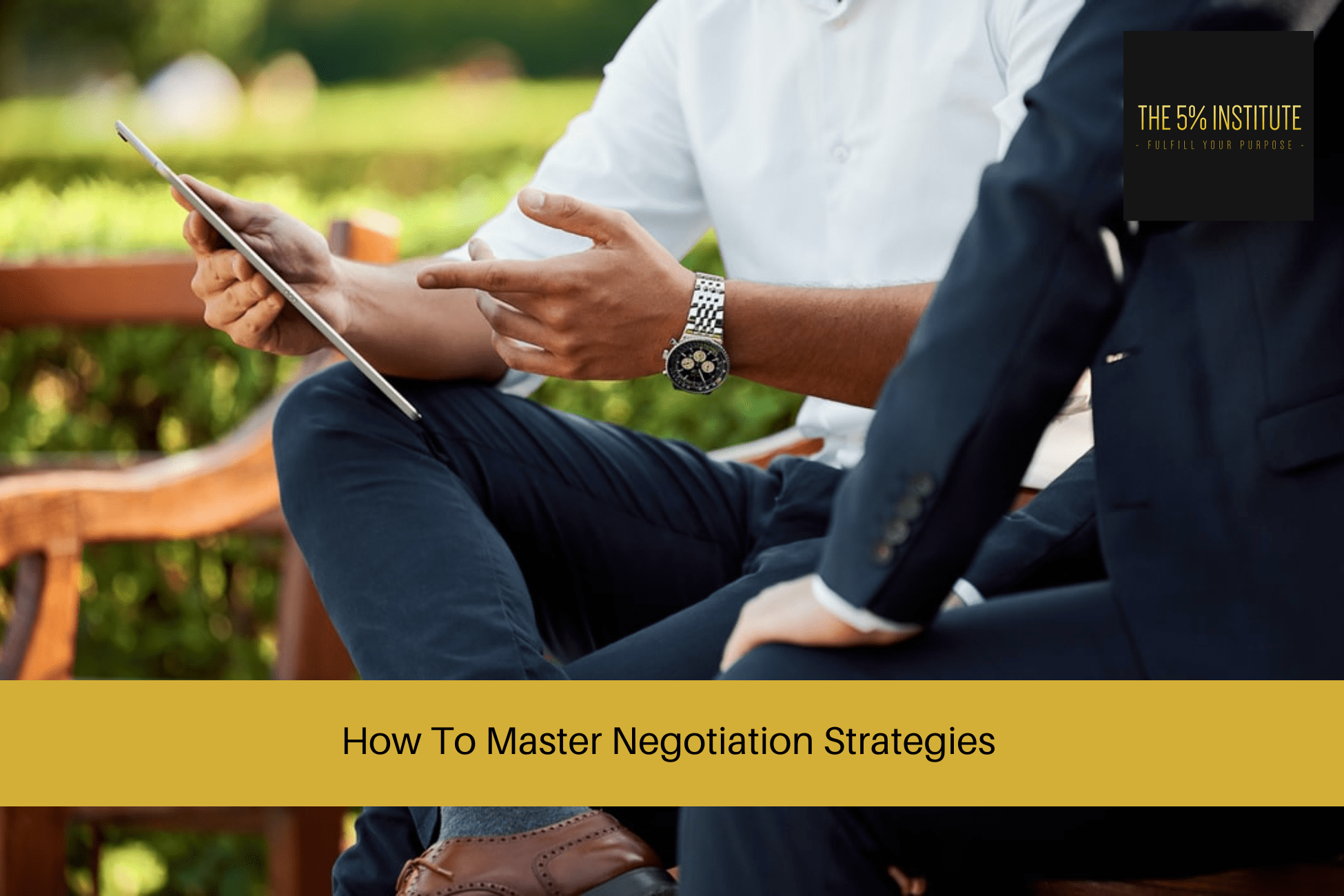
How To Master Negotiation Strategies
Negotiation strategies are an essential skill that plays a pivotal role in various aspects of life, from business deals to personal relationships.
The ability to navigate through negotiations effectively can significantly impact the outcomes and benefits one can achieve.
In this article, we will explore the importance of having a robust negotiation strategy and provide practical tips and insights to help you become a skilled negotiator.
1. Introduction
Negotiation strategy refers to the approach and plan one adopts when engaging in a negotiation process.
It involves a systematic and thoughtful approach to achieve desired outcomes while maintaining positive relationships with the other party involved.
A well-defined negotiation strategy can enhance your chances of success and maximize the value you gain from any negotiation.
2. Importance of Negotiation Strategy
Having a clear negotiation strategy is crucial for several reasons.
Firstly, it allows you to set clear objectives and define what you want to achieve from the negotiation.
Without a strategy, you might find yourself getting side-tracked or losing focus during the negotiation process.
Secondly, a well-planned strategy helps you understand the other party better.
By conducting thorough research and analysis, you can identify their interests, motivations, and potential constraints.
This knowledge gives you an advantage in crafting persuasive arguments and finding mutually beneficial solutions.
3. Setting Clear Objectives
Before entering any negotiation, it is essential to define your objectives clearly.
What do you hope to accomplish? What are your priorities?
By setting specific goals, you can align your negotiation strategy accordingly and focus your efforts on achieving the desired outcomes.
When setting objectives, it is crucial to be realistic and consider both your needs and the needs of the other party.
Negotiations are most successful when they result in a win-win situation, where both parties feel satisfied with the outcome.
4. Understanding the Other Party
A key aspect of effective negotiation strategy is understanding the other party involved.
Conduct research and gather information about their interests, preferences, and potential constraints.
This knowledge allows you to tailor your approach, arguments, and offers to appeal to their specific needs and motivations.
Furthermore, understanding the other party enables you to anticipate their potential objections or concerns, which allows you to be better prepared during the negotiation process.
By demonstrating empathy and addressing their concerns proactively, you can build rapport and trust, which are crucial for successful negotiations.
5. Building Rapport and Trust
Building rapport and trust is essential in any negotiation.
People are more likely to reach mutually beneficial agreements with individuals they trust and perceive positively.
Building rapport can be achieved through active listening, showing respect, and finding common ground with the other party.
Establishing trust requires credibility and reliability. Honesty, transparency, and fulfilling commitments are vital in building trust during negotiations.
When the other party trusts you, they are more likely to be open to your proposals and consider mutually beneficial options.
6. Effective Communication
Communication is a cornerstone of successful negotiations.
It is essential to articulate your ideas clearly, listen actively, and ask relevant questions.
Effective communication helps in understanding the other party’s perspectives, clarifying expectations, and finding common ground.
During negotiations, it is important to be mindful of your body language, tone of voice, and choice of words.
Non-verbal cues can significantly impact how your messages are received. Maintaining a respectful and constructive tone fosters a positive negotiation environment and encourages collaboration.
7. Creating Win-Win Solutions
Negotiations should strive to create win-win solutions, where both parties benefit from the agreement.
It is essential to explore options that address the interests of both sides and find creative solutions that maximize the value for everyone involved.
Collaboration and a problem-solving mindset are crucial in generating win-win outcomes.
By focusing on shared interests and long-term relationships, rather than positional bargaining, you can uncover innovative solutions that meet both parties’ needs.
8. Flexibility and Adaptability
Negotiations are dynamic processes that often require flexibility and adaptability.
Being rigid or sticking to a predefined plan can hinder the negotiation process and limit the potential for successful outcomes.
A strong negotiation strategy includes room for flexibility and adaptation.
It allows you to respond to unexpected challenges, explore new options, and adjust your approach based on the evolving circumstances.
Flexibility demonstrates your willingness to find mutually beneficial solutions and can contribute to building trust with the other party.
9. Leveraging Power Dynamics
Power dynamics can significantly influence negotiations. Understanding and leveraging power imbalances can give you an advantage in the negotiation process.
Power can manifest in various forms, such as expertise, resources, or the ability to provide valuable alternatives.
Identify your strengths and leverage them strategically during negotiations.
At the same time, be aware of the other party’s sources of power and find ways to balance or counterbalance them.
Skilled negotiators know how to use power effectively without resorting to aggressive tactics that could damage relationships.
10. Handling Difficult Situations
Negotiations can encounter challenging situations, such as conflicts, deadlocks, or unexpected demands.
Skilled negotiators are adept at managing difficult circumstances and steering the negotiation process towards productive outcomes.
In challenging situations, it is crucial to remain calm, composed, and focused on the objectives.
Active listening, empathy, and finding common ground can help defuse tensions and move the negotiation forward.
By reframing problems as opportunities and maintaining a problem-solving mindset, you can overcome obstacles and find mutually acceptable solutions.
11. Managing Emotions
Emotions can play a significant role in negotiations.
It is essential to manage your own emotions and be mindful of the other party’s emotions during the negotiation process.
Uncontrolled emotions can impair judgment and lead to suboptimal outcomes.
Recognize and acknowledge emotions, both yours and the other party’s, without letting them dictate the negotiation process.
Maintain a calm and composed demeanour, and respond to emotional cues with empathy and understanding.
By managing emotions effectively, you can create a more constructive negotiation environment and foster better communication.
12. Avoiding Common Negotiation Mistakes
Many negotiators fall into common pitfalls that can jeopardize successful outcomes.
By being aware of these mistakes, you can avoid them and enhance your negotiation skills.
Some common negotiation mistakes include being overly aggressive, making assumptions, failing to listen actively, and rushing to reach an agreement without exploring alternatives.
Additionally, neglecting to conduct proper research or lacking preparation can undermine your negotiation position.
Awareness of these mistakes helps you navigate negotiations more effectively and achieve better results.
13. Utilizing Negotiation Tactics
Negotiation tactics are specific techniques and approaches used to influence the other party and achieve desired outcomes.
While tactics can vary depending on the negotiation context, it is important to approach their use ethically and with the intention of creating value for both parties.
Some commonly used negotiation tactics include anchoring, mirroring, framing, and exploring multiple offers simultaneously.
However, it is essential to use tactics judiciously and adapt them to the specific negotiation situation.
Overusing or misusing tactics can damage relationships and hinder the negotiation process.
14. Evaluating and Reflecting on Negotiation Outcomes
After a negotiation concludes, it is valuable to evaluate the outcomes and reflect on the process.
Assessing the negotiation results helps you identify strengths, areas for improvement, and lessons learned.
Consider the achieved outcomes against your initial objectives and evaluate the value created for both parties.
Reflect on your negotiation approach, communication effectiveness, and the strategies employed.
Continuous learning and self-reflection contribute to honing your negotiation skills and becoming a more proficient negotiator.
15. Conclusion
Mastering the art of negotiation requires a well-defined strategy, effective communication, and the ability to navigate complex dynamics.
By setting clear objectives, understanding the other party, building rapport, and employing effective tactics, you can increase your chances of achieving favourable outcomes.
Remember to be flexible, adaptable, and mindful of power dynamics throughout the negotiation process.
Manage emotions, avoid common mistakes, and reflect on your negotiation experiences to continuously improve your skills.
By honing your negotiation strategy, you can confidently approach any negotiation and create win-win solutions that benefit all parties involved.
FAQs
1. How can I improve my negotiation skills?
To enhance your negotiation skills, focus on active listening, empathy, and understanding the other party’s perspective.
Practice setting clear objectives, conducting research, and adapting your approach based on the situation.
Continuous learning, reflection, and seeking feedback can also contribute to your skill development.
2. What should I do if negotiations reach a deadlock?
In a deadlock situation, it is crucial to remain calm and explore alternative solutions.
Consider involving a mediator or introducing new options to break the impasse.
Open and honest communication, with a focus on finding common ground, can help overcome deadlocks.
3. How important is trust in negotiations?
Trust is vital in negotiations as it fosters open communication, collaboration, and mutually beneficial outcomes.
Building trust requires honesty, transparency, and fulfilling commitments.
Trust also allows for more flexible and creative problem-solving during negotiations.
4. How do I handle aggressive negotiators?
When faced with aggressive negotiators, it is important to remain calm and assertive.
Maintain a professional demeanour, focus on the issues at hand, and avoid responding in a confrontational manner.
Set boundaries and redirect the negotiation towards constructive dialogue and problem-solving.
5. What role does preparation play in negotiations?
Preparation is key to successful negotiations.
It involves conducting research on the other party, understanding their interests, and defining your objectives.
Adequate preparation allows you to anticipate challenges, devise persuasive arguments, and demonstrate credibility during negotiations.
Want To Close Sales Easier?
Are you committed to closing sales a lot easier, and consistently?
If so, you should check out our self-paced and affordable online sales training program; The 5% Sales Blueprint.
It’ll give you everything you need to close sales consistently.
To learn more, simply click on the link below for more information.
Our Online Sales Training Program – The 5% Sales Blueprint.



